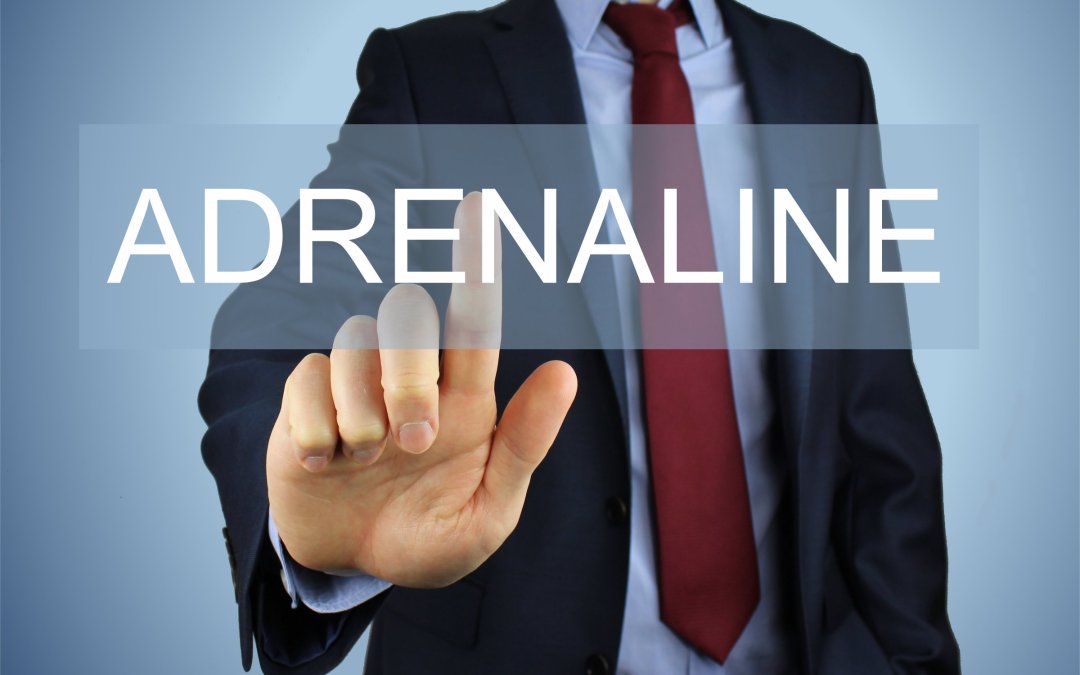The 4th of July is reminding us of the blessings of living in America. However, our divisions and international threats can easily bring on a great deal of stress and anxiety. Moments of panic may follow. While there are many things that increase one’s vulnerability to panic attacks, the root cause is an excess of adrenalin. Unfortunately, some people are much more vulnerable to those effects than others.
Fight or Flight Response
We were born with an automatic gift of fight or flight. When the brain recognizes a threat, it signals the release of a powerful hormone called adrenalin (epinephrine). Immediately, heart rate, pulse, blood pressure, respiratory rate among other things will rapidly increase. Blood is moved into the muscles to prepare one to run away from the threat or fight it. That response is great when in a burning building and you need to get out. However, adrenalin and the annoying symptoms linger long after the threat dissipates.
In some people the symptoms following the adrenal surge are really uncomfortable. The heart is pounding, blood pressure is higher, and it can feel awful! The discomfort is frightening and further increases adrenalin making the annoying symptoms even worse.
Patients have described it to me like they’re having a heart attack. Appropriately they head to the ER only to be told the cardiac tests were normal. It’s confusing for sure. We instruct patients who have the symptoms of a heart attack to do exactly that…head to the ER to get checked.
A Review of the Symptoms of a Heart Attack:
–Any discomfort from the chin to the naval, into the back or the jaw or arm.
–Shortness of breath.
–Unusual fatigue, lightheadedness, cold sweat.
If you experience any of these symptoms…seek medical help immediately.
However, there are a lot of organs in these areas which can also cause similar symptoms. If the tests come back normal it’s helpful to ask about a potential panic attack issue.
Panic Disorder
Panic Disorder is characterized by episodic, unexpected panic attacks that occur without a clear trigger. Panic attacks are defined by the rapid onset of intense fear (typically peaking within about 10 minutes) with at least four of the physical and psychological symptoms.
The abrupt surge can occur from a calm state or an anxious state.
- Palpitations, pounding heart, or accelerated heart rate.
- Sweating.
- Trembling or shaking.
- Sensations of shortness of breath or smothering.
- Feelings of choking.
- Chest pain or discomfort.
- Nausea or abdominal distress.
- Feeling dizzy, unsteady, light-headed, or faint.
- Chills or heat sensations.
- Paresthesias (numbness or tingling sensations).
- Derealization (feelings of unreality) or depersonalization (being detached from oneself).
- Fear of losing control or “going crazy.”
- Fear of dying.
No wonder people feel like they’re having a heart attack.
Tips to Control Adrenalin Surges
As frustrating and frightening as panic attacks can be there are ways to shut down the adrenalin surges. It’s helpful advice for all of us who are faced with a stressful event. We can learn to lower the amount of adrenalin released which will help us to maintain a healthier blood pressure, heart and brain. The trick is to stop the cycle.
–Remind yourself what this is…an adrenalin surge and you can control it.
–Take some slow deep breaths.
–Get up and move.
–Call a friend.
–Focus on something beautiful.
–Turn on a program you usually enjoy.
–If you’ve been described medication…take it.
–Pray for relief.
–Speak to your spiritual advisor or a cognitive behavioral counselor.
While adrenalin works great if you need to run away from a predator, too much is a real nuisance if it’s triggered by a rude person on the telephone, an argument with your spouse or worries over an ever-changing dangerous world threat. Remember that some people are simply more sensitive to adrenalin surges than other people. You’re not crazy. Prayer is the most powerful antidote for me…may it be for you as well.
Do not be anxious about anything, but in everything by prayer and supplication with thanksgiving let your requests be made known to God. And the peace of God, which surpasses all understanding, will guard your hearts and your minds in Christ Jesus. Philippians 4: 6-7
I hope you had a fun and blessed 4th of July with your friends and family.
Reference:
“Warning Signs of a Heart Attack,” American Heart Association, (December 5, 2022). https://www.heart.org/en/health-topics/heart-attack/warning-signs-of-a-heart-attack
Guillermo Firman, “DSM-5 Diagnostic Criteria for Panic Disorder,” MedicalCRITERIA.com (August 27, 2020). https://medicalcriteria.com/web/panic-disorder/
Jamie Smith, “How Can You Stop a Panic Attack?” Medical News Today, (November 30, 2023). https://www.medicalnewstoday.com/articles/321510 .
Jennie E. Johnson, “Wake Up Call 911: It’s Time to Reduce your Risk for a Heart Attack and Stroke,” Living for A Healthy Heart, LLC, (2016).
I’m a Christian nurse who helps people navigate the murky waters of healthcare.
If you’d like to read my other blogs you may visit my website for more information (jenniejohnsonrn.com).
Author of Helping the Hurting: Nursing Ministry in the Body of Christ (2022) and Wake Up Call 911: It’s Time to Reduce your Risk for a Heart Attack and Stroke (2015).
All rights reserved 2023, Jennie E. Johnson, RN-BC, PhD
Paperback copies of both books for sale. Email me for details at: ask@jenniejohnsonrn.com.

Recent Comments